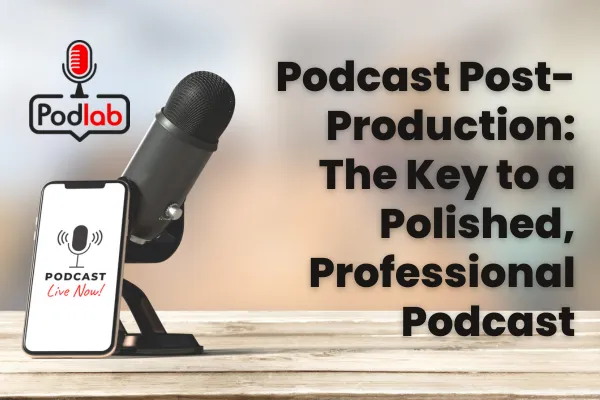PodLab Blog Posts

Podcast Post-Production: The Key to a Polished, Professional Podcast
Post-Production: The Key to a Polished, Professional Podcast
Launching a podcast is an exciting venture, but recording your episode is just the beginning. The magic happens in podcast post-production services—a detailed process that transforms raw audio into a polished, engaging, and professional final product. From editing and mixing to creating SEO-optimized podcast show notes and promotional assets, each step enhances your podcast’s quality and boosts its potential to attract listeners and grow your audience.
In this article, we’ll break down the essential steps of podcast post-production, explain why each is important, and highlight how they contribute to a standout podcast.
Why Podcast Post-Production Matters
Post-production is more than just “cleaning up” your audio. It’s about:
Creating a professional sound: High-quality production builds credibility.
Engaging your audience: Smooth, polished episodes keep listeners coming back.
Expanding your reach: Strategic assets like audiograms for podcasts and podcast distribution strategies help grow your audience.
Let’s explore the key components of podcast post-production and their benefits.
1. Audio Editing: The Foundation of Quality
Audio editing removes distractions like filler words, long pauses, background noise, and mistakes. This step ensures your content flows smoothly, keeping your listeners engaged.
Why It Matters
Improves clarity: A clean, distraction-free listening experience makes your message shine.
Enhances professionalism: Tight editing reflects the care and effort behind your podcast.
Pro Tip: Use tools like Adobe Audition or Descript to streamline the podcast audio editing process and ensure professional results.
2. Audio Mixing: Balancing the Soundscape
Mixing is where the magic of sound design happens. It involves balancing voice levels, adjusting EQ, compressing audio for consistency, and removing harsh “s” sounds with de-essing.
Benefits of Proper Mixing
Clear audio: Ensures all voices and sound effects are balanced and easy to hear.
Enhanced listener comfort: Prevents volume spikes or dips that disrupt the experience.
3. Mastering: The Final Polish
Mastering ensures your podcast sounds great across all devices, from car speakers to earbuds. This process includes normalizing volume levels, adding limiters, and refining the overall sound.
Why Mastering Matters
Consistency: Your podcast sounds professional, no matter where it’s played.
Retention: Listeners are more likely to stick around when your audio is smooth and polished.
4. Video Editing for Video Podcasts
If you’re creating video podcasts, editing is essential. This includes syncing audio and video, trimming mistakes, and adding graphics, captions, and intros/outros.
Video Editing Benefits
Enhanced engagement: Visual elements keep viewers interested.
Wider reach: Platforms like YouTube expand your podcast’s visibility.
Pro Tip: Use these video editing for podcast tips to create dynamic content that resonates with your audience.
5. Show Notes: Your Podcast’s Cheat Sheet
Show notes summarize your episode, highlight key points, and provide links to resources or guest information. They’re also an SEO goldmine for podcasts.
Advanced Show Notes
Timestamps: Help listeners skip to specific sections.
SEO-optimized descriptions: Include keywords like “how to edit a podcast professionally” to improve discoverability.
Example: For an episode on “content marketing for small businesses,” use phrases like “content marketing strategies for small businesses” or “tips for small business owners.”
6. Transcriptions: Accessibility and SEO
Transcriptions are written versions of your podcast. They make your content accessible to those who prefer reading or are hard of hearing. Plus, they’re a great resource for repurposing podcast content.
Why Transcriptions Are a Must
Broader reach: Cater to a diverse audience.
SEO boost: Search engines index your transcripts, increasing discoverability.
Repurposing potential: Turn transcripts into blog posts, quotes, or audiograms for podcasts.
7. Audiograms and Social Media Assets
Audiograms combine audio snippets with visuals like waveforms or captions. They’re perfect for promoting episodes on platforms like Instagram, Twitter, and LinkedIn.
Benefits
Shareability: Eye-catching assets encourage listeners to share your content.
Audience growth: Attract new listeners by teasing your best moments.
8. Vertical Video Reels: Short-Form Content That Packs a Punch
Reels on Instagram, TikTok, and YouTube Shorts are a powerful way to showcase highlights from your podcast.
Why Reels Work
Engage younger audiences: Reels resonate with social media-savvy listeners.
Drive traffic: Use short-form podcast video content as teasers to lead viewers to your full episodes.
9. Custom Thumbnails for YouTube
Thumbnails are the first thing viewers see on YouTube. A compelling thumbnail with bold text and high-quality visuals increases your click-through rate.
10. Uploading, Scheduling, and Distributing
Consistency is key in podcasting. Uploading your episode, adding metadata, and scheduling your release ensure a seamless publishing process.
Distribution Channels
Apple Podcasts
Spotify
YouTube
Social media platforms
Benefits
Build loyalty: A consistent release schedule keeps your audience engaged.
Expand reach: Broad distribution makes your podcast accessible to diverse audiences.
Final Thoughts
Podcast post-production is where your raw recording transforms into a memorable listening experience. Each step—editing, mixing, mastering, creating SEO-optimized show notes, and developing promotional assets—plays a vital role in enhancing your podcast’s quality and reach.
Whether you’re handling post-production yourself or working with a professional podcast post-production agency, investing in this process ensures your podcast stands out in a crowded market. Remember, a polished podcast isn’t just about sounding good—it’s about building an experience your listeners will love and return to.
Ready to elevate your business with a professional podcast? Whether you're just starting out or looking to take your podcast to the next level, PodLab can help you become a market leader and attract more clients. Book a FREE podcast consultation call with us today and let's discuss how we can make podcasting a powerful tool for your business. Click here to schedule your session now!
Happy podcasting!

Navigation
Contact Us
© 2023 All Rights Reserved
Podlab.agency

